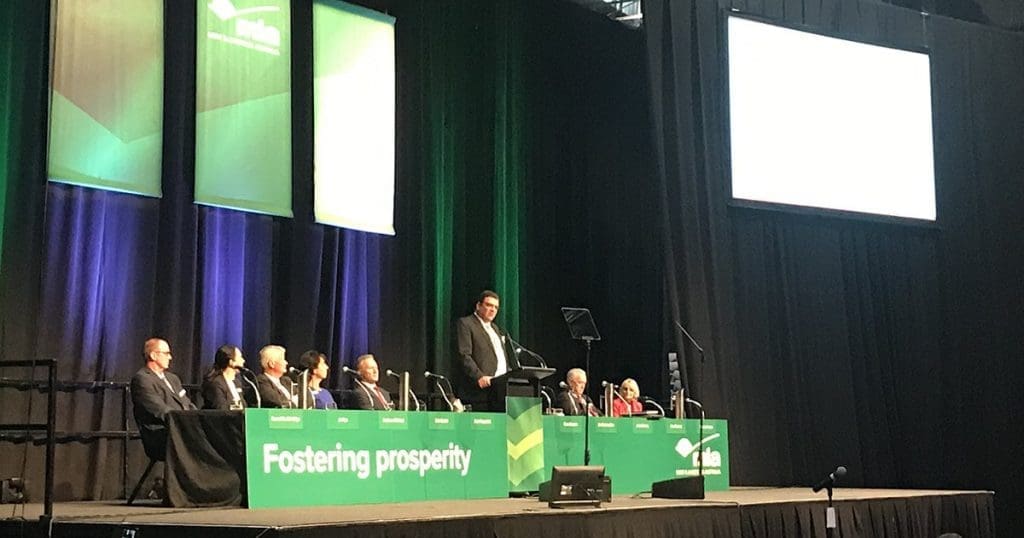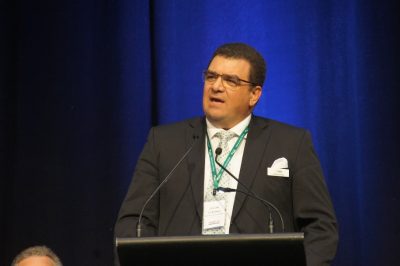
Managing Director Jason Strong addresses the 2019 MLA AGM in Tamworth on Wednesday afternoon. Picture: MLA
“Fewer, Bigger, Bolder” will become Meat & Livestock Australia’s mantra as it works to achieve a new industry goal of doubling the value of Australian red meat sales by 2030, Jason Strong announced in his first address as managing director to the MLA AGM in Tamworth on Wednesday.
The new Red Meat 2030 plan released last month, which sets a goal for the industry to double the value of Australian red meat sales within the next 10 years, is creating “a major shift in mindset” at a board and senior management level at Meat & Livestock Australia, Mr Strong said.
Achieving the goal will require change in the way MLA operates, he said. Every decision, every action and every investment will be made to create unprecedented transformational change, aimed at creating and capturing more value for producers and the red meat supply chain.
How will those changes look?
 “We are going to do fewer things, we are going to do them bigger, and we are going to be bolder about our ambitions,” he said.
“We are going to do fewer things, we are going to do them bigger, and we are going to be bolder about our ambitions,” he said.
“Fewer, bigger, bolder will become one of our key guiding principles.
“The reason for this approach it to ensure what we do and how we do it will deliver real impact for levy payers.
“We have an opportunity to help the industry create unprecedented transformational change.
“This will be our driving force.”
He said the approach will mean more initiatives which can truly change the prospects of the industry such as CN2030, a goal launched by then Managing Director Richard Norton at the 2017 MLA AGM for Australia’s red meat industry to be carbon neutral by 2030.
Mr Strong said the target – described earlier in the day by community sentiment expert Howard Parry-Husbands as “genuinely genius” – sets a path to “turn today’s pressures into tomorrow’s opportunities” for the Australian red meat industry.
“It sends a clear signal to government and consumers that the red meat industry appreciates the concerns around climate change and is proactively addressing emissions, which reinforces our reputation as global leaders in sustainable red meat production.”
“CSIRO research has shown it is possible to achieve this goal, while maintaining animal numbers, combined with, continued improvements in vegetation management, methods to reduce livestock methane emissions, and improve carbon storage in soils.
“Let’s be clear, our view on being carbon neutral is that is has to be in the context of improved profitability, intergenerational business sustainability and leaving the environment in better shape than we found it.”
Collaboration, leadership needed
Mr Strong said that to achieve the goal of doubling the value of Australia’s red meat sales by 2030 will require a level of collaboration that hasn’t always been as evident in the industry as it needs to be.
It would require working together across industry with producers, feedlots, processors, wholesalers, butchers, chefs, retailers, exporters and importers.
“We need to put aside vested interests, show leadership, and all think of how we can individually and collectively contribute to the common good to double the value of the red meat sales in the next 10 years.”
Mr Strong acknowledged that the job will not be easy, particularly given the challenges of drought, floods and fires which have all recently wrought havoc on Australia’s red meat industry and slashed herd and flock numbers.
MLA to waive fees
He said the MLA Board has agreed to do everything in its power to fast-track the uptake the adoption of as many tools as possible that MLA delivers direct to levy payers to aid in the national recovery process.
“The first component of this will be, from Monday 25 November until June 30 2021, MLA will waive all fees and charges relating to all products and services delivered directly to MLA levy payers.
“This will include things like LPA and NVD, training workshops, producer MSA activities, field days, workshops.
“By temporarily removing these costs, our intention is to support levy payers directly, and fast track adoption by using everything in our collective and individual powers to drive the national recovery of the red meat industry.
“This is not the only measure, but it is the first step to show our commitment to support industry.”
Industry urged to step up
By temporarily removing costs that it can control, Mr Strong said it was hoping for a shared commitment from industry to focus on what “we can influence individually and collectively to support red meat levy payers”.
“Success will require a concerted collective team effort. I have no doubt the red meat industry is up for the challenge. We are resilient. When we work together we can achieve anything.
“MLA has already started down this path. Since the launch of RMAC’s 10-year vision of doubling the value of sales, together with my management team, we have thrown ourselves into shaping our road map ahead – identifying fewer, bigger, bolder ways we can support the industry.
“We are focused on not only what we do, but how we do it to create unprecedented transformational change. I look forward to working with you and building a sustainable, more profitable, more resilient industry.”

HAVE YOUR SAY